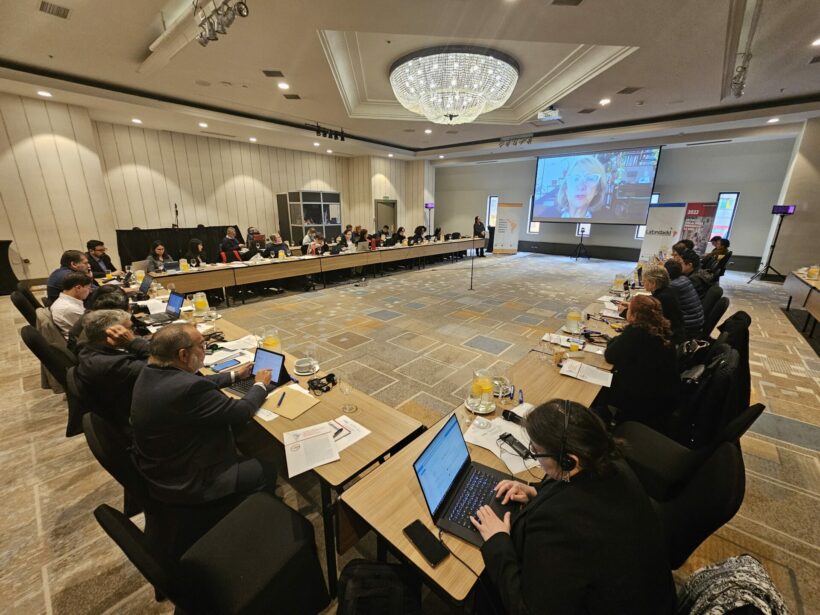Specialists analyse the importance of building a fair tax system to guarantee public funding for education.
By Anddy Landacay, from the National Public Budget Group (GNPP) and the Peruvian Campaign for the Right to Education (CPDE)
In the framework of the Regional-Global Workshop “Tax Justice and the Human Right to Education”, held on 8 and 9 September in Santiago (Chile), a series of presentations were given that illustrated the experiences on tax justice and its relationship with the right to public education.
In the first block entitled “State of the World Situation on Taxation and Impact on Education”, Dereje Alemayehu, from the Global Alliance for Tax Justice (GATJ), Vernor Muñoz, from the Global Campaign for Education (GCE) and Mariana Huepe, from the Economic Commission for Latin America and the Caribbean (ECLAC) intervened.
The first intervention was made by Dereje Alemayehu, who emphasised the need for an equitable distribution of the public budget: “With regard to the allocation of budgets, it is good that there is already a cake to share it, but it must be divided fairly,” she said.
Vernor Muñoz described the harsh reality of discrimination and exclusion suffered by the indigenous population in the global north and how it is not enough to increase tax revenues without a human rights approach: “The case of Finland, which is famous for its educational achievements, according to a report by the European Union, shows cases of discrimination and racist harassment. Tax increases and efficient revenue collection do not necessarily ensure greater resources to combat inequality,” she concluded.
Finally, Mariana Huepe from ECLAC intervened and stressed that: “On average, Latin America complies with the minimums agreed in the Incheon Declaration in relation to the percentage of GDP as a percentage of total public spending”, but at the same time she emphasised that “to increase national funding for education, it is necessary to: broaden the tax base, prevent tax evasion, increase the proportion of the national budget allocated to education, this has to go hand in hand with strengthened institutions to use existing resources more equitably and efficiently”, she commented.
About the event
The meeting is one of the actions of the Right to Education with Tax Justice project which, since 2022, seeks to promote the exchange of experiences from different continents on tax justice and education and proposals for mechanisms to increase public spending in favour of public education.
In addition to Vernor Muñoz, Mariana Huepe and Dereje Alemanyehu, the meeting will be attended by Nelsy Lizarazo, general coordinator of the Latin American Campaign for the Right to Education (CLADE); Adrián Falco, executive secretary of the Latin American Network for Tax Justice (Latinddad); Chenai Mukumba, from TJNA; Seruwagi Jane Nalunga and Aida Jean Nacpil Manipon, as well as senators and representatives from the six countries that are part of the initiative, Argentina, Colombia, Guatemala, Paraguay, Peru and the Dominican Republic.
About the project
The Right to Education with Tax Justice initiative aims to increase the participation of social organisations in Argentina, Colombia, Guatemala, Paraguay, Peru and the Dominican Republic to influence the agendas of key government actors and promote demands for greater mobilisation of domestic resources in Latin American and Caribbean countries, through the implementation of more progressive tax policies, in order to increase the financing of public education systems in a sustainable, fair and progressive manner so that governments can achieve the goals of the 2030 Agenda, especially Sustainable Development Goal 4, related to education.
To this end, it uses research, communication and campaigning, advocacy and the strengthening of local organisations as its priorities.
The project is carried out by the Latin American Campaign for the Right to Education (CLADE), the Latin American Network for Economic and Social Justice (Latindadd) and the Tax Justice Network of Latin America and the Caribbean (RJFLAC).
In each country, the initiative relies on the alliance of two organisations: Fundación SES and Campaña Argentina por el Derecho a la Educación (CADE) in Argentina; Coalición Colombiana por el Derecho a la Educación – CCDE and Centro de Estudios del Trabajo (CEDETRABAJO) in Colombia; Colectivo para la Educación de Todas y Todos de Guatemala and Tzum Kim-Pop in Guatemala; Decidamos and Red por el Derecho a la Educación (RED) in Paraguay; Campaña Peruana por el Derecho a la Educación (CPDE) and Grupo Nacional De Presupuesto Público in Peru, as well as Centro Montalvo and Foro Socioeducativo (FSE) in the Dominican Republic.










